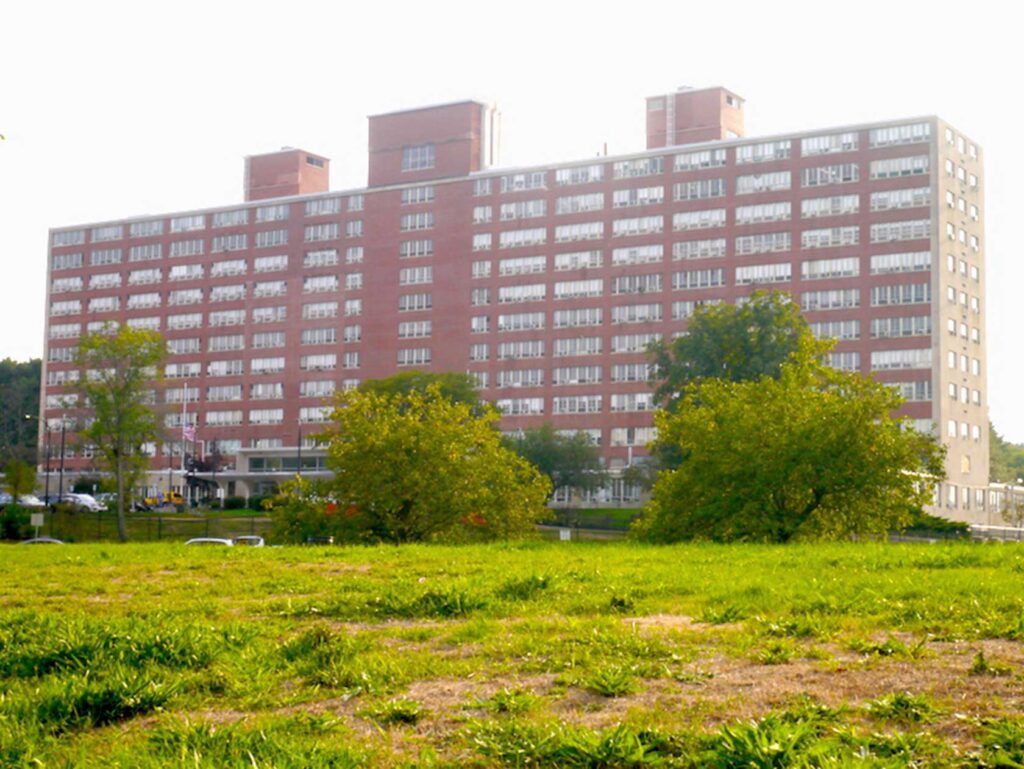
During a lengthy Boston City Council hearing last Thursday, some community members residing near Franklin Park voiced concerns over the scope of the plan to overhaul the Lemuel Shattuck Hospital, while others showed support for the project.
The comprehensive redevelopment plan led by the state in partnership with Boston Medical Center would see the installation of more than 400 supportive housing units and another 450 treatment beds in the hospital to expand substance use treatment services.
City Councilor Tania Fernandes Anderson, who represents residents in abutting neighborhoods, said she called the meeting after receiving an “overwhelming” number of emails in opposition to the project, compared to just a handful of emails for it. While Fernandes Anderson said she supports housing and treatment facilities, she is “not in support of putting the housing piece in Franklin Park” and raised questions about whether or not the project was equitable for communities in surrounding neighborhoods.
At the meeting, representatives of Boston Medical Center outlined the proposed project and strove to address concerns raised by Fernandes Anderson and residents, many of which were about the scope of the project.
BMC said it is working to adjust its proposed plan.
“We’re in the process of trying to incorporate feedback and being in a position where we can bring back and talk through modifications to the plan with community stakeholders,” said Robert Koenig, Boston Medical Center’s vice president of strategic plans. “We recognize folks here are here because they’re passionate, and because they believe in what they’re talking about. We really respect and appreciate that.”
Koenig said there are just under 420 beds of services operational in the Shattuck, down from 550 beds before the pandemic. BMC’s original plan sought to decrease the number of clinical and shelter beds while adding 400 permanent supportive housing units, a number that far exceeded the state’s RFP requirement of up to 100 supportive housing units.
BMC primary care physician and medicine specialist Dr. Christine Pace said the proposed plan would increase access to care for people in recovery and facing mental health issues, many of whom are also experiencing homelessness.
During the hearing, residents raised concerns about the effect the project would have on drug use in the area and the safety of nearby residents. Some said they are worried about the increased presence of needles in family-friendly areas.
“It is important that we understand that the exposure of having people who are working towards recovery in the same site with people who have no oversight — it’s a conflict of interest,” said Leah Randolph, a community member who said she is in long-term recovery and has also run outpatient programs.
When Council President Ruthzee Louijeune said “Part of the frustration that we feel is like everything is happening in Boston, when this is a statewide issue,” Fernandes Anderson added that, “Everything is happening in Boston, but everything is happening in District 7.”
She said many of the proposed development projects in the city — namely Shattuck, White Stadium, the Blue Hill Avenue redevelopment — are taking place in the neighborhoods she serves. “The list goes on and on and on,” she said.
When asked if or when BMC would consider bowing out of the project given the primarily negative response from community members, Koenig said the organization has been “trying to weigh that in and hold at once that feedback that we’re getting…with simultaneously the public health crises that our initial proposal sought to address.”
He added that BMC was the only respondent to the state’s RFP and that as a nonprofit, it would not see monetary gain from carrying out the Shattuck development plan.
BMC said in its revised proposal, it plans to adjust the scope of the project and take into consideration community concerns around safety, although it did not outline how. Fernandes Anderson asked that BMC provide specifics going forward.
According to some residents, the redevelopment of Shattuck is a much-needed response to a widespread issue. Rev. Darrell Hamilton of the First Baptist Church in Jamaica Plain said the proposal would not only serve Roxbury residents but also those in Mattapan, Jamaica Plain and Dorchester.
“I know there’s a lot of concern about the scale of this project, but my sentiment is that the scale of the project is designed to meet the scale of the crisis, designed to meet the scale of the need and frankly, is not even able to fully do that, because the need is so great,” he said.
“Treatment and supportive programs like the ones proposed for this campus saved my life,” said Brendan Little, a Jamaica Plain resident. “This proposal addresses two of the most urgent needs in our community right now: substance use disorder and homelessness.”
Little refuted the notion that the Shattuck redevelopment plan would result in a crisis similar to that at Mass and Cass.
“I wouldn’t be reading this testimony today if I didn’t get the help I needed 20 years ago. I’d likely still be homeless and in active addiction,” he said. “It is only because of services like the ones proposed here that I’ve been able to thrive personally and spend a career in public service.”






